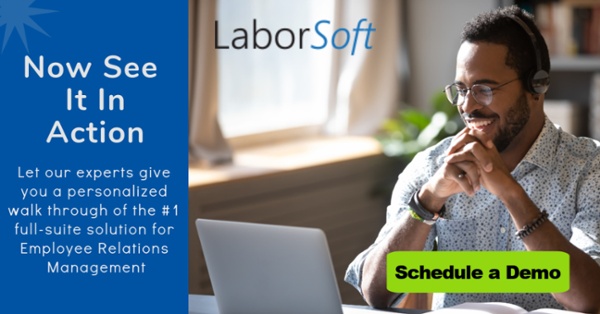Compliance in Employee Grievances and Arbitration
Read Time 6 mins | May 13, 2025 | Written by: LaborSoft

In any HR department, few responsibilities carry as much organizational (and legal!) weight as employee grievance management. Even for minor concerns, HR must follow compliant, well-documented procedures to mitigate risk, maintain transparency, and uphold employee trust. If the HR grievance escalates to arbitration, the stakes are even higher. Failure to meet these standards is a road to costly litigation and reputational harm — not to mention the resulting internal instability.
Take a moment to examine the key legal and compliance issues HR professionals must address when handling employee grievances and arbitration. LaborSoft experts have gathered actionable guidance to help you meet those standards.
How to Achieve a Smooth Grievance Process & Minimize Risks
PRIORITY #1: Legally Compliant Grievance Procedures
Employee grievance procedures can act, in part, as a forum for employees to voice concerns, but they must do more than that. Your grievance processes are required to meet specific legal expectations established by federal and state labor laws. Title VII of the Civil Rights Act, the National Labor Relations Act (NLRA), and the Americans with Disabilities Act (ADA) all set strict requirements for how employers handle complaints related to things like discrimination, harassment, accommodation, and other protected categories.
When HR policies lack consistency or when managers fail to follow established steps, the company becomes vulnerable to claims of retaliation or discrimination. Every employer — unionized or not — needs a documented grievance process that outlines the steps for:
- Submitting a complaint in writing
- Notifying the appropriate internal contacts
- Conducting the HR investigation process
- Responding to the employee
- Appealing the outcome (if applicable)
This process must also be applied consistently, with no exceptions, and align with internal policies and labor law requirements. There are many common mistakes to look out for and proactively sidestep. Employers have to be extra careful and vigilant that all supervisors and managers are trained on how (and when) to escalate concerns.
Grievance procedures that meet this threshold reduce risk and foster credibility with employees who might otherwise feel their concerns are being dismissed.
PRIORITY #2: Thorough Documentation
There’s incredible legal value in a robust and accurate document repository related to the organization’s current and historical employee grievances. One of HR’s biggest compliance responsibilities during the grievance process, after all, is keeping detailed records. Inaccurate or incomplete information can be devastating when complaints escalate to legal action. The written record should be created in real time and should include:
- The original written complaint or grievance form
- Notes from any interviews or follow-up discussions
- Internal communications regarding the grievance
- Summaries of investigative findings
- Any disciplinary or corrective action taken
- A final resolution statement
This documentation becomes essential when HR decisions are challenged — especially in claims of wrongful termination, discrimination, or retaliation. Even when the organization acted fairly and within policy, weak documentation makes it difficult to demonstrate that fact to regulators, courts, or arbitration panels.
Employers will want to evaluate and select HR case management software that provides centralized access to all relevant documentation. It’s best if the tools in the platform can generate a complete, customizable timeline of case activity.
PRIORITY #3: Transparency, Clarity, and Consistency
Employee grievances impact workplace culture. If your employees perceive the grievance process as inconsistent, delayed, or biased, it ultimately undermines the credibility of HR and leadership. This damage can ripple through the organization, lowering morale and increasing turnover.
Transparency and consistency must be the foundation of every grievance and arbitration effort. That means following policies to the letter, documenting each step thoroughly, and triple-checking that every employee receives the same treatment and access to the same process.
In doing so, HR simultaneously shields the organization from litigation and builds a stronger, more resilient workforce.
Corner Cases & Other Grievance Compliance Considerations
Arbitration Clauses: Legal Streamlining or Risk?
Arbitration agreements are a common fixture in employee contracts and collective bargaining agreements. These clauses commit both parties to resolve disputes through arbitration rather than litigation, which can save time and reduce legal expenses. However, HR teams need to evaluate whether their proposed arbitration agreement is both effective and enforceable before deciding to use one.
The Federal Arbitration Act (FAA) permits employers to include mandatory arbitration provisions, but recent court cases have shown that certain clauses may be challenged if they are vague, overly broad, or seen as coercive. Employers should always avoid blanket waivers that remove all rights to litigation. Arbitration clauses are required to be:
- Clearly written and easy to understand
- Acknowledged by the employee (preferably with a signature)
- Limited to specific types of employment-related disputes
- Compliant with federal and state regulations
HR must also be prepared to follow the arbitration process as outlined. This includes timely selection of a neutral arbitrator, adherence to notice requirements, and full cooperation in discovery.
Privacy and Confidentiality Challenges
Grievances often involve deeply personal matters — harassment, discrimination, retaliation, and mental health are all common themes. In every case, HR must take care to maintain strict confidentiality in accordance with the Fair Labor Standards Act (FLSA), the ADA, HIPAA (when applicable), and any relevant state privacy laws. It’s incumbent upon your HR team to:
- Limit access to investigative records
- Secure digital and physical documentation
- Control how and when information is shared with internal stakeholders
- Avoid gossip or speculation that could compromise an employee’s privacy
Poor handling of confidential information turns what may have been a seemingly simple complaint about a social media post into a serious legal liability. You can help reduce these risks — and keep HR’s handling of each case defensible — with clearly documented confidentiality policies, access logs, and a centralized case management platform.
HR Investigations and Grievances in Unionized Environments
When an employee grievance falls under the rules of a collective bargaining agreement (CBA), the employer must follow the specific procedures set by that contract. These requirements vary but often include:
- Designated timeframes for filing and responding to grievances
- Formal meetings with union representatives
- Required documentation formats
- A defined arbitration process for unresolved issues
HR teams need to be fully fluent in the terms of any CBAs that apply to their workforce. Noncompliance — even if accidental! — can result in grievances being upheld by default or escalated to regulatory scrutiny.
It’s hard to understate the value of HR case management software in delicate management-union interactions. An all-in-one platform like LaborSoft keeps your team on top of deadlines and allows you to attach union-specific documentation templates. It’s a simple matter to demonstrate strict compliance with each contractual step when all the tools are at your fingertips.
The Bottom Line
An employee grievance is never about resolving just a single issue. It’s about consistency and compliance for the long-term success of the organization. The way you manage grievance and arbitration procedures can be confident and transparent, or it can include missteps that lead to unnecessary risk. Make sure to protect sensitive data and carefully manage risks so that you avoid legal consequences while preserving trust across the organization.
With the right tools and processes in place, HR can get the job done right.
LaborSoft provides HR case management software that supports these goals with built-in compliance tracking and secure document handling. Our platform gives you structured workflows tailored to the complexities of both individual and unionized employee relations. Get in touch with the LaborSoft team for more information or to schedule a personalized demo.


